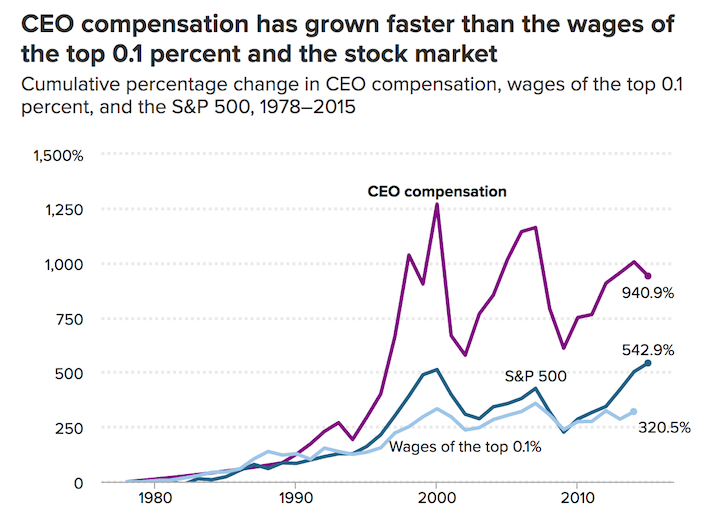Shareholders are the ultimate owners of any publicly traded business.
By putting capital on the line to gain fractional ownership in a company, shareholders will participate in the successes (and failures) of the underlying business.
Company management has some very obvious goals that are dictated by shareholders, including:
There are also certain behaviors that are considered shareholder-friendly, which typically include dividend payments and share repurchases.
This article will discuss 6 signs of a shareholder friendly stock in detail.
#1:Reasonable Levels of Executive Compensation
Executive compensation is a hot topic on both Main Street and Wall Street.
The CEOs of large corporations are almost always the highest-paid employees, and total compensation can reach the $20 million+ range.
Further, CEO compensation has been growing more quickly than the rest of the 0.1% and the stock market (as measured by the S&P 500).

Source: Economic Policy Institute
There are two measures by which the shareholder-friendliness of a company’s executive compensation program can be checked.
First, the total compensation package of a business’ upper-level management should be in the same range as its peers.
Information about executive compensation is disclosed in a filing called the ‘Definitive 14A proxy statement’ with the U.S. Securities and Exchange Commission (SEC).
You can find company filings with the SEC by searching this database. For information on executive compensation, search for ‘DEF 14A’ filings, which will return the company’s ‘Other definitive proxy statements’.
For an example, you can see Johnson & Johnson’s CEO compensation package below.

Source: Johnson & Johnson Proxy Circular
Another important consideration is whether executive compensation is dependent on the performance of the business that they lead.
In most cases, this is certainly the case. CEO compensation is usually dependent on the company meeting certain financial performance targets.
These targets are outlined in the same DEF 14A filings with the SEC. Johnson & Johnson’s criteria for their executive compensation package can be seen below.

Source: Johnson & Johnson Proxy Circular
For investors looking to own shareholder-friendly companies, finding businesses whose executive compensation practices are reasonable anddependent on company performance is a great place to start.
#2:High Levels of Insider Ownership
Insider ownership is when company insiders (executives, board members, etc.) own company stock.
When insider ownership levels are high, this means that company management has a lot of faith in the business’ investment prospects.
Since company management knows more about the business than any investor, shareholders can rest assured that the most-informed individuals are confident in the company’s future.
The requirement of insider ownership is also seen as shareholder-friendly corporate governance.
Details about executive stock ownership requirements can be found in the company’s 14A proxy statements which are filed with the SEC (the same document that holds information about executive compensation).
For instance, Johnson & Johnson’s executive stock ownership requirements can be seen below.

Source: Johnson & Johnson Proxy Circular, page 44
Notice that the stock ownership guidelines are expressed as a multiple of base salary. This is typical among companies who require executives to be shareholders.
A textbook example of high insider ownership is Warren Buffett’s Berkshire Hathaway (BRK-A) (BRK-B).
Berkshire is a large conglomerate with holdings in many industries (including insurance, manufacturing, and railways) that also has a large portfolio of common stock investments.
You can see an analysis of Berkshire Hathaway’s top 20 high yield dividend stocks here.
In Berkshire Hathaway’s 2016 definitive proxy statement, the company reported that Mr. Buffett owned 38.2% of Berkshire Hathaway’s Class A stock. This high level of insider ownership is almost unheard of in a company as large as Berkshire.













Leave A Comment